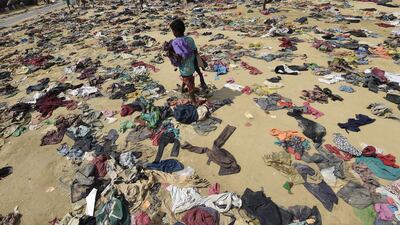Naypyidaw, the purpose-built city inaugurated as Myanmar's capital in 2006, is six times the size of New York. People vanish in its immensity, including, it would seem, Aung San Suu Kyi, Myanmar's de facto leader. As Rakhine, a large province on the country's west coast, became a theatre of ethnic cleansing directed at its Muslim Rohingya inhabitants, she was nowhere to be seen. International luminaries implored her to intervene to halt the violence. Dr Muhammad Yunus, Ms Suu Kyi's fellow Nobel laureate, from Bangladesh, took to this newspaper's opinion pages to deplore her reticence and demand corrective action. Was she listening, or had she, too, become lost in Naypyidaw's stupefying sprawl?
On Tuesday morning, she finally addressed the mounting criticism directed at her in a speech to a gathering of diplomats and journalists. She reminded the world that Myanmar's democracy is young and fragile; that her own government, elected in 2015, has been in power for less than 18 months; that she had already taken steps to settle the uncertain status of the Rohingya by inviting foreign experts, led by former United Nations chief Kofi Annan, to study the crisis and make recommendations for its resolution; and that the recent violence erupted when Rohingya militants attacked police and army outposts last month.
Even the most sympathetic observer cannot have failed to notice that Ms Suu Kyi, for the all the apparent constraints on her, shares the most virulent prejudices against the Rohingya. She began her speech by saying that her government was working to “promote harmony between the Muslim and Rakhine communities”.
_______________
Read more
Aung San Suu Kyi says Myanmar does not fear global scrutiny over Rohingya crisis
Emergency meeting seeks stronger response to Rohingya crisis
The Rohingya: a tragedy decades in the making
_______________
This distinction between the “Muslim” and the “Rakhine communities” is a reiteration of the argument that Muslims are aliens in Rakhine. She revealed her contempt rather than concern for the Rohingya when she said she was “concerned to hear that numbers of Muslims are fleeing across the border to Bangladesh”. Some 400,000 Rohingya have escaped in a matter of weeks, and Ms Suu Kyi, who refuses to call them by their name, says now that she wants to “find out why this exodus is happening”.
Any hope that the Rohingya refugees in Bangladesh might be permitted to return home was doused by Ms Suu Kyi's invocation of "verification" processes. But how do you "verify" the status of a people who have been denied citizenship and driven from their homes? It's a trick to make their expulsion permanent. Ms Suu Kyi deployed some clever language to convey that only some of Mr Annan's recommendations will be implemented. Citizenship for the Rohingyas? Perish the thought.
“Let me be clear”, Ms Suu Kyi told an interviewer in 2010. “I would like to be seen as a politician, not some human rights icon”. On Tuesday, she showed the world that she had finally become a politician, one who is as ruthless as the generals who built the soulless city in which she assumed power.
Follow The National's Opinion section on Twitter

